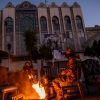
Kifah Zainie, 34, co-owns and manages Sugar Man, a preferred nightspot in Damascus, on March 27. Zainie says he is unsure about the way forward for the alcohol trade, underneath Syria’s new conservative Muslim rulers.
Hasan Belal for NPR
disguise caption
toggle caption
Hasan Belal for NPR
DAMASCUS — Naveen Mahmoud was out working errands when an alarmed neighbor referred to as: The conservative Muslim rebels who ousted Syria’s dictator late final 12 months had arrived to close down the fashionable cocktail bar Mahmoud runs within the Previous Metropolis of Damascus.
Two authorities brokers positioned an iron rod throughout the entrance door of Mahmoud’s bar, referred to as Cosette, and sealed it shut Thursday with crimson wax — a technique that goes again to antiquity.
“We were very concerned when they first took power [in December], but they came and said, ‘Everything will be the same [as under deposed President Bashar al-Assad], no worries,’ ” says Mahmoud, 42, who labored in Cyprus and Turkey earlier than returning to her native Syria to open Cosette 5 years in the past. “But all of a sudden, they did this! They didn’t give us any reason, or any warning.”
Hers was considered one of 60 Damascus bars that had been both forcibly shut this previous week, or acquired authorities notices that they quickly could be, for serving alcohol and not using a license, Mahmoud and three different individuals who work in Syria’s alcohol trade advised NPR.
However after a social media outcry, and appeals to the Damascus mayor, all 60 closures had been lifted — after lower than a day.
It is an instance of how Syria’s new leaders — who as soon as had ties to al-Qaida — are nonetheless discovering their manner, wrestling with the way to mesh their conservative Islamic values with the secular life-style of a lot of their fellow residents and urbanites specifically.
Partying with former Islamist fighters
The evening after Assad fled, Kifah Zainie threw a celebration on the widespread Damascus watering gap he co-owns and runs, referred to as Sugar Man. Cocktails had been flowing. It felt like a carnival, he remembers.
However Zainie, 34, who wears a stonewashed denim jacket with a flipped collar, had a niggling fear: Syria’s new leaders had banned alcohol in Idlib, northwest Syria, the place they first ruled in 2017. And Zainie makes a residing from serving alcohol.
Ten days later, round mid-December, two bearded guys with weapons knocked on his door. They requested if he had an alcohol license. Zainie doesn’t.
To get one, a 1952 legislation stipulates you must be situated greater than 100 meters (yards) from a faculty or non secular website — which guidelines out most areas in central Damascus. Authorities have not issued new licenses for his space since 1960 anyway, Zainie says.
Below the Assad regime, whereas alcohol consumption was authorized, most bars had been unlicensed. Homeowners would pay a tremendous for that — about $2, each few months, Zainie remembers — and authorities left them alone.
Below the brand new regime, he worries it won’t be as straightforward. On a lark, he invited the bearded guys into his bar that evening — supplied they put down their weapons. (Zainie wasn’t positive in the event that they had been official authorities brokers, or militiamen near the regime.)
“They said OK yes, and came in, and — I have video — they danced!” Zainie remembers, laughing. “It was very strange, just like performance art, like bin Laden danced with us!”
He confirmed NPR video on his telephone of two bearded males in camouflage, dancing and smiling, surrounded by secular hipsters.
“At that time, we felt like we could connect with these people, if we just shake hands,” Zainie says. “They are Syrian!”
Unusual bedfellows within the new Syria
With worldwide sanctions nonetheless in place, many multinational corporations cannot do enterprise in Syria. So it is troublesome for Syrian distributors to import international manufacturers.
A secular, tattooed alcohol wholesaler named Abboudi says a method he will get round sanctions is by shopping for liquor in bulk from Islamist fighters within the mountains between Lebanon and Syria. They’ve a warehouse, he says, filled with confiscated stuff.
“We pay $2,000 for one hour’s opening, [during which time] we take whatever we can! One hundred boxes, 200 boxes, 500 — you have one hour!” he explains.
Abboudi did not need NPR to publish his surname, as a result of what he is describing is illegitimate.
He calls his suppliers Daesh — the Arabic title for ISIS — however acknowledges he would not know their precise affiliation. He would not go to them alone, and makes positive he is carrying a gun.
Pushback from drinkers
Mahmoud says she tried to satisfy Syria’s conservative leaders midway: She voluntarily closed Cosette throughout fasting hours within the holy month of Ramadan, and put curtains on the home windows so that folks cannot see in from exterior.
After they shut her down, she says it felt like betrayal — of her enterprise, and likewise of the coexistence that is made Damascus well-known for raucous nightlife, even in wartime.
“People here, they respect each other. They respect each other’s religions, traditions,” she says.
She factors across the room at her workers: Two are Christian, a number of are Muslim. She’s from the Syrian capital’s Circassian minority, an ethnic group with roots within the Caucasus.
NPR requested Syria’s Inside Ministry and the Damascus governor’s workplace in regards to the bar closures, and why they had been shortly reversed. The Inside Ministry mentioned it was unaware of steps taken by native police. The governor’s workplace confirmed the reversal however wouldn’t present additional particulars.
Mahmoud believes this can be a lesson for them.
“What worked in Idlib won’t work in Damascus,” she says.
NPR producer Jawad Rizkallah contributed to this story from Damascus.





